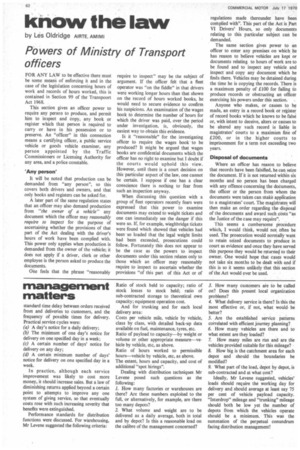know the law
Page 64

If you've noticed an error in this article please click here to report it so we can fix it.
by Les Oldridge AIRTE, AMIMI
Powers of Ministry of Transport officers
FOR ANY LAW to be effective there must be some means of enforcing it and in the case of the legiislation concerning hours of work and records of hours worked, this is contained in Section 99 of the Transpoort Act 1968. .
This section gives an officer power to require any person to produce, and permit him to inspect and copy, any book or register which that person is required to carry or have in his possession or to preserve. An "officer" in this connection means a certifying officer, a public service vehicle or goods vehicle examiner, any person appointed by the Traffic Commissioners or Licensing Authority for any area, and a police constable.
'Any person'
It will be noted that production can be demanded from "any person", so this covers both drivers and owners, and that only books and registers can be asked for.
A later part of the same regulation states that an officer may also demand production from "the owner of a vehicle" any document which the officer may reasonably require to inspect for the purpose of ascertaining whether the provisions of that part of the Act dealing with the driver's hours of work have been complied with. This power only applies when production is demanded from the owner of the vehicle; it does not apply if a driver, clerk or other employee is the person asked to produce the documents.
Ohe feels that the phrase "reasonably require to inspect" may be the subject of argument. If the officer felt that a fleet operator was "on the fiddle" in that drivers were working longer hours than that shown on the record of hours worked books, he would need to secure evidence to confirm his suspicions. An examination of the wages book to determine the number of hours for which the driver was paid, over the period under investigation, is, obviously, the easiest way to obtain this evidence.
Is it "reasonable" for the investigating officer to require the wages book to be produced? It might be argued that wages books are confidential documents which the officer has no right to examine but I doubt if the courts would uphold this view. However, until there is a court decision on this particular aspect of the law, one cannot be certain. I suppose if one has a clear conscience there is nothing to fear from such an inspection anyway.
When discussing this question with a group of fleet operators recently fears were expressed that this power to examine documents may extend to weight tickets and one can immediately see the danger if this were so. If, for example, wieghbridge tickets were found which showed that vehicles had been so loaded that the legal weight limits had been exceeded, prosecutions could follow. Fortunately this does not appear to be the case as the powers to inspect documents under this section relates only to those which an officer may reasonably require to inspect to ascertain whether the provisions "of this part of this Act or of
regulations made thereunder have been complied with". This part of the Act is _Part VI Drivers' Hours, so only documents relating to this particular subject can be demanded.
The same section gives power to an officer to enter any premises on which he has reason to believe vehicles are kept or documents relating to hours of work are to be found and to inspect any vehicle and inspect and copy any document which he finds there. Vehicles may be detained during the time he is copying the records. There is a maximum penalty of £100 for failing to produce records or obstructing an officer exercising his powers under this section.
Anyone who makes, or causes to be made, an entry in a record book or register of record books which he knows to be false or, with intent to deceive, alters or causes to be altered any such record is liable in magistrates' courts to a maximum fine of £200, or in the higher courts to imprisonment for a term not exceeding two years.
Disposal of documents Where an officer has reason to believe that records have been falsified, he can seize the document. If it is not returned within six months and no person has been charged with any offence concerning the documents, the officer or the person from whom the documents were taken can make application to a magistrates' court. The magistrates will then make an order regarding the disposal of the documents and award such costs "as the Justice of the case may require".
This seems a cumbersome procedure which, I would think, would not often be used. The prosecution would normally want to retain seized documents to produce in court as evidence and once they have served this purpose they would be returned to their owner. One would hope that cases would not take six months to be dealt with and if this is so it seems unlikely that this section of the Act would ever be used.








































































































